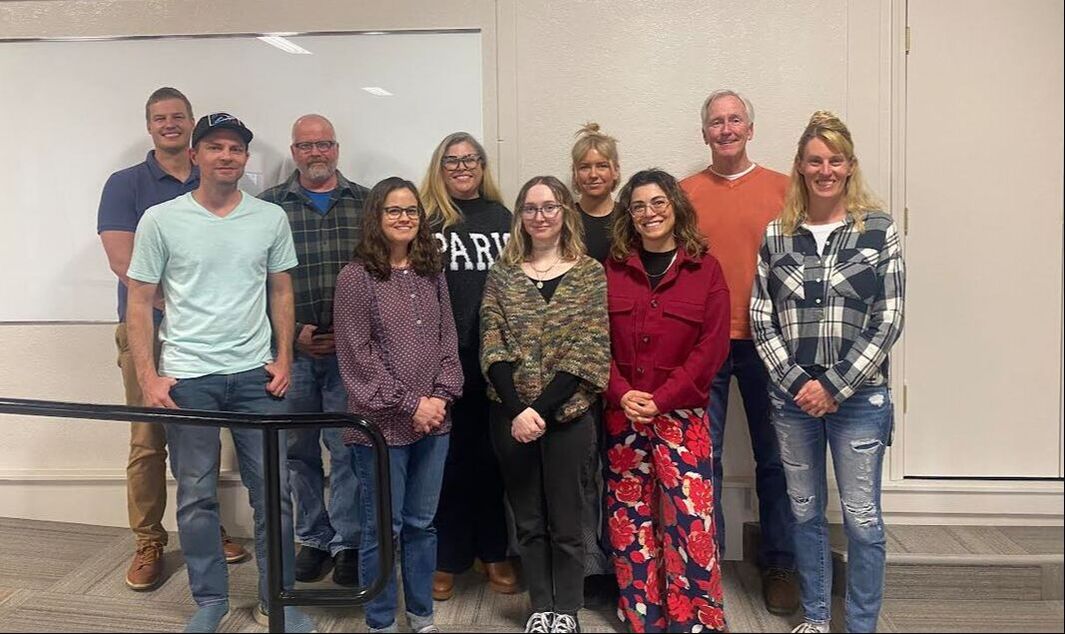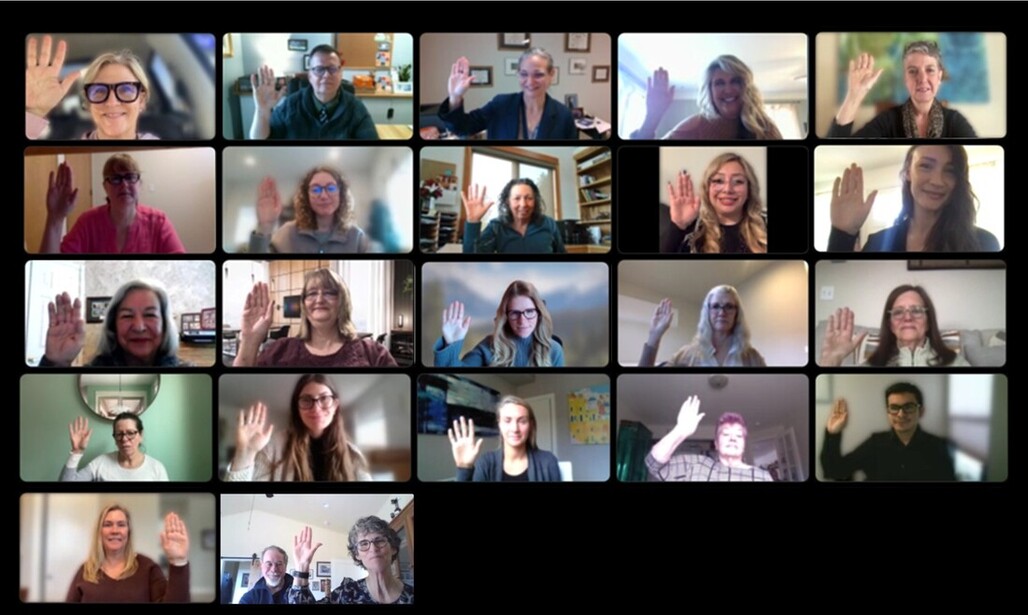Celebrating Our Newest CASA Advocates in Central Oregon!
June 24, 2024 -- We are excited to announce the swearing-in of six new CASA volunteers here at CASA of Central Oregon! These passionate individuals have completed their rigorous training and were sworn in by Judge Flint, marking a significant milestone in their journey to advocate for foster youth in our community.
Our CASA volunteers play a crucial role in ensuring that every child in foster care has a dedicated advocate, someone who will stand up for their best interests both in court and in their everyday lives. With backgrounds as diverse as their dedication, these volunteers have undergone specialized trauma-informed training, equipping them to navigate the complexities of the foster care system with empathy and expertise.
Now that they are officially sworn in, our new advocates are ready to dive into their roles. They will work closely with children, families, social workers, and the court system to provide personalized advocacy. This includes conducting thorough investigations, attending court hearings to represent the child's perspective, and advocating tirelessly to ensure that each child's needs are met.
"I am incredibly proud of this training class for their dedication and hard work over the last eight weeks,” said Eric Noyes, the training and recruitment coordinator. “They have not only completed the training but have also actively engaged with the material and difficult discussion topics. Their commitment and passion are making a tangible difference in the lives of children in foster care in Central Oregon."
Last year alone, 458 children in Central Oregon spent time in foster care, and thanks to the dedication of volunteers like ours, many of these children were supported by a CASA advocate. However, there are still children waiting for someone to be their voice. Currently, 59 children in our region are eagerly waiting for a CASA volunteer to step forward.
If you have ever considered making a profound difference in a child's life by becoming a CASA volunteer, now is the time to act. We are currently accepting applications for our upcoming two fall training sessions, one starting on September 10th from 9am to 12:30pm, at The DCF Rosie Bareis Community Campus, and another training starting September 12th, from 1:30-5pm online via Zoom. The eight week trainings will provide you with the knowledge and tools needed to become a powerful advocate for children in need.
Join us in congratulating our new CASA advocates and celebrating their commitment to improving the lives of foster youth in Central Oregon. Together, we can ensure that every child has the support they deserve. Visit our volunteer page to learn more about becoming a CASA volunteer and to Apply today.
Our CASA volunteers play a crucial role in ensuring that every child in foster care has a dedicated advocate, someone who will stand up for their best interests both in court and in their everyday lives. With backgrounds as diverse as their dedication, these volunteers have undergone specialized trauma-informed training, equipping them to navigate the complexities of the foster care system with empathy and expertise.
Now that they are officially sworn in, our new advocates are ready to dive into their roles. They will work closely with children, families, social workers, and the court system to provide personalized advocacy. This includes conducting thorough investigations, attending court hearings to represent the child's perspective, and advocating tirelessly to ensure that each child's needs are met.
"I am incredibly proud of this training class for their dedication and hard work over the last eight weeks,” said Eric Noyes, the training and recruitment coordinator. “They have not only completed the training but have also actively engaged with the material and difficult discussion topics. Their commitment and passion are making a tangible difference in the lives of children in foster care in Central Oregon."
Last year alone, 458 children in Central Oregon spent time in foster care, and thanks to the dedication of volunteers like ours, many of these children were supported by a CASA advocate. However, there are still children waiting for someone to be their voice. Currently, 59 children in our region are eagerly waiting for a CASA volunteer to step forward.
If you have ever considered making a profound difference in a child's life by becoming a CASA volunteer, now is the time to act. We are currently accepting applications for our upcoming two fall training sessions, one starting on September 10th from 9am to 12:30pm, at The DCF Rosie Bareis Community Campus, and another training starting September 12th, from 1:30-5pm online via Zoom. The eight week trainings will provide you with the knowledge and tools needed to become a powerful advocate for children in need.
Join us in congratulating our new CASA advocates and celebrating their commitment to improving the lives of foster youth in Central Oregon. Together, we can ensure that every child has the support they deserve. Visit our volunteer page to learn more about becoming a CASA volunteer and to Apply today.
Community Members Sworn-In as CASA Volunteers to Support Local Children in Foster Care
March 14, 2024 -- In Central Oregon, the support for children in foster care just got a boost with 16 new CASA volunteers stepping up to advocate for them.
Sworn in by Judge Hillman, these dedicated community members are now diving into their first cases, ready to make a difference.
At present, there are 59 children eagerly waiting for a CASA volunteer in Central Oregon. If you've ever considered becoming a volunteer advocate, now is the time. CASA of Central Oregon is actively seeking new volunteers, and applications are open. Training sessions kick off on April 30th at the Becky Johnson Community Center in Redmond, running on Tuesday evenings from 5 to 8:30 pm. The classes will be conducted in person.
If you or someone you know has the heart to join this noble cause as a CASA volunteer, seize the opportunity and Apply today.
Sworn in by Judge Hillman, these dedicated community members are now diving into their first cases, ready to make a difference.
At present, there are 59 children eagerly waiting for a CASA volunteer in Central Oregon. If you've ever considered becoming a volunteer advocate, now is the time. CASA of Central Oregon is actively seeking new volunteers, and applications are open. Training sessions kick off on April 30th at the Becky Johnson Community Center in Redmond, running on Tuesday evenings from 5 to 8:30 pm. The classes will be conducted in person.
If you or someone you know has the heart to join this noble cause as a CASA volunteer, seize the opportunity and Apply today.
Community Members Sworn-In as CASA Volunteers to Support Local Children in Foster Care
November 7, 2023 -- Congratulations to our 17 new CASA volunteers! The Honorable Judge Bethany Flint swore in the new Court Appointed Special Advocates, or CASA volunteers, via WebEx. These volunteers are already hard at work advocating for children.
Right now, there are 48 children waiting for a CASA volunteer in Central Oregon. CASA of Central Oregon is currently accepting applications to become a volunteer advocate. The next training sessions begin in January. Classes will be online and in-person. If you or someone you know is interested in joining these folks as CASA volunteers, please Apply now.
Right now, there are 48 children waiting for a CASA volunteer in Central Oregon. CASA of Central Oregon is currently accepting applications to become a volunteer advocate. The next training sessions begin in January. Classes will be online and in-person. If you or someone you know is interested in joining these folks as CASA volunteers, please Apply now.
|
CASAs can change children's lives. Here's the story of a little girl named Evey and her CASA, Larry. |
|
Community Members Sworn-In as CASA Volunteers to Support Local Children in Foster Care
March 23, 2023 -- Local children in foster care now have 19 more CASA volunteers advocating for them. Deschutes County Judge Bethany Flint swore in the new Court Appointed Special Advocates, or CASA volunteers, via WebEx.
Last year, 439 children spent time in foster care in Central Oregon. 364 of these children were served by a CASA volunteer. The goal of CASA of Central Oregon is to recruit, train and support enough volunteers so that every child in foster care has their own assigned CASA volunteer. We know that when families are under stress, more children are at risk of abuse and neglect. Right now, there are 39 children waiting for a CASA volunteer in Central Oregon.
CASA of Central Oregon is currently accepting applications to become a volunteer advocate. The next training is scheduled to begin Monday, May 1, 2023. It is being held at the High Desert ESD in Redmond. The training will consist of eight weekly sessions and conclude on June 19.
The CASA volunteer represents the child’s best interest in court and in the community during their time in foster care. All volunteers complete a thorough training process that includes 40 hours of trauma-informed training, a background check, and an interview with a Judge before being sworn-in as an officer of the court and assigned a child or sibling group currently in foster care in Crook, Deschutes, or Jefferson counties.
The deadline to apply for this session is April 20, 2023. Apply now.
Last year, 439 children spent time in foster care in Central Oregon. 364 of these children were served by a CASA volunteer. The goal of CASA of Central Oregon is to recruit, train and support enough volunteers so that every child in foster care has their own assigned CASA volunteer. We know that when families are under stress, more children are at risk of abuse and neglect. Right now, there are 39 children waiting for a CASA volunteer in Central Oregon.
CASA of Central Oregon is currently accepting applications to become a volunteer advocate. The next training is scheduled to begin Monday, May 1, 2023. It is being held at the High Desert ESD in Redmond. The training will consist of eight weekly sessions and conclude on June 19.
The CASA volunteer represents the child’s best interest in court and in the community during their time in foster care. All volunteers complete a thorough training process that includes 40 hours of trauma-informed training, a background check, and an interview with a Judge before being sworn-in as an officer of the court and assigned a child or sibling group currently in foster care in Crook, Deschutes, or Jefferson counties.
The deadline to apply for this session is April 20, 2023. Apply now.
Suttle Lodge Winter Beer Fest to Benefit CASA

Join us for the Suttle Lodge Winter Beer Festival benefitting CASA of Central Oregon! The event will be three whole days of Bavarian-inspired outdoor fun with 20+ craft breweries, food + snacks, live music and ALL the cozy winter fun. Taste new releases from from 28 Oregon breweries, snuggle by the toasty fires, enjoy live music, take in the fresh forest air and eat all the warm pretzels! The festival will be held over Presidents' Day Weekend (Friday, Feb 18-Sunday, Feb 20) in the Rustic Village area of the Suttle Lodge & Boathouse. For tickets and more information visit https://thesuttlelodge.com/happenings/upcoming/wbf
Community Members Sworn-In as CASA Volunteers to Support Local Children in Foster Care
November 1, 2021 –– Local children in foster care now have 14 more CASA volunteers advocating for them. On October 28th, fourteen new Court Appointed Special Advocates, or CASA volunteers, were sworn in remotely by Judge Bethany Flint.
The CASA volunteers represent the child’s best interest in court and in the community during their time in foster care. All volunteers complete a thorough training process that includes 40 hours of trauma-informed training, a background check, and an interview with a Judge before being sworn-in as an officer of the court and assigned a child or sibling group currently in foster care in Crook, Deschutes, or Jefferson counties.
Read More
November 1, 2021 –– Local children in foster care now have 14 more CASA volunteers advocating for them. On October 28th, fourteen new Court Appointed Special Advocates, or CASA volunteers, were sworn in remotely by Judge Bethany Flint.
The CASA volunteers represent the child’s best interest in court and in the community during their time in foster care. All volunteers complete a thorough training process that includes 40 hours of trauma-informed training, a background check, and an interview with a Judge before being sworn-in as an officer of the court and assigned a child or sibling group currently in foster care in Crook, Deschutes, or Jefferson counties.
Read More
|
Our 2021 Casablanca Fundraiser was a huge success! We raised over $80,000 thanks to the support of our community. Funds raised from this event will support our recruitment and training of additional volunteers to help foster children in our community have a voice. Watch our event showcase! Learn more |
|

Matching Gift Challenge!
Through the generosity of the WHH Foundation, monthly giving donors through the Heroes of Hope program will see their donations matched up to $25,000! Visit our Heroes of Hope program to sign up today and double your impact!
Through the generosity of the WHH Foundation, monthly giving donors through the Heroes of Hope program will see their donations matched up to $25,000! Visit our Heroes of Hope program to sign up today and double your impact!
Channel 21 Featured CASA of Central Oregon Advocate Training Program
By: Kendall Keenan
Air Date: April 3, 2021
By: Kendall Keenan
Air Date: April 3, 2021

CASA Of Central Oregon: A Voice For Children
BY ANNETTE BENEDETTI
Published on January 20, 2019 in the Bend Nest
This year alone, approximately 500 abused and neglected children in Crook, Deschutes and Jefferson counties spent time in foster care. Many of them have gone, or will go through, multiple foster placements before the courts determine their final destination. Without a loving parent or family member to speak up for their best interests, their lives are in the hands of individuals who may spend less than an hour or two speaking with them before determining their futures. Fortunately, there are advocates whose sole purpose is to give a voice to children in foster care. They are the court-appointed special advocates of Central Oregon.
In an over-burdened child welfare system, it's easy for a child's needs to be overlooked. CASA of Central Oregon is a nonprofit that supports children as they make their way through the foster care and family court system. The organization's vision is for all children to be safe, treated with dignity and respect and to learn and grow in the home of a loving family. CASA of Central Oregon's Development Director Heather McPherson says, "We work towards our vision by recruiting, training and supporting volunteers who advocate for the best interests of abused and neglected children in the court system."
Read the rest of the article at the Bend Nest website.
BY ANNETTE BENEDETTI
Published on January 20, 2019 in the Bend Nest
This year alone, approximately 500 abused and neglected children in Crook, Deschutes and Jefferson counties spent time in foster care. Many of them have gone, or will go through, multiple foster placements before the courts determine their final destination. Without a loving parent or family member to speak up for their best interests, their lives are in the hands of individuals who may spend less than an hour or two speaking with them before determining their futures. Fortunately, there are advocates whose sole purpose is to give a voice to children in foster care. They are the court-appointed special advocates of Central Oregon.
In an over-burdened child welfare system, it's easy for a child's needs to be overlooked. CASA of Central Oregon is a nonprofit that supports children as they make their way through the foster care and family court system. The organization's vision is for all children to be safe, treated with dignity and respect and to learn and grow in the home of a loving family. CASA of Central Oregon's Development Director Heather McPherson says, "We work towards our vision by recruiting, training and supporting volunteers who advocate for the best interests of abused and neglected children in the court system."
Read the rest of the article at the Bend Nest website.

Hurting to Happy: A story of CASA Advocacy
Trenton missed his parents. He didn’t like it when they used drugs, but he still loved them. When he went into foster care, he had to move. Trenton couldn’t focus at his new school.
His little sister Tierra missed her mom and didn’t understand why they didn’t see her very much. Tierra had a lot of ear infections and cried at night with pain.
In the family court system, Trenton and Tierra were just two of hundreds of children to be managed by a DHS case worker and a judge. But Barbara, their Court Appointed Special Advocate, or CASA, knew that these kids were more than just a number. They were unique and special children with specific needs. Without Barbara’s care and advocacy, they could get lost in the system.
Barbara regularly met with everyone in Trenton and Tierra’s lives, including their foster parents, birth parents, and therapists, to give a full report on the children to the court. She advocated for the kids outside of court, attending parent-teacher conferences and enrolling Trenton in after-school activities. When Tierra’s doctor recommended that she get tubes in her ears to treat her chronic ear infections, Barbara followed up with the paperwork to get the procedure approved and scheduled.
While Barbara watched the kids grow and learn, she also saw their mom working to get her life back on track. When their mom left her abusive partner and created a stable home, Barbara recommended to the court that the children should be reunited with their mother.
Not long ago Barbara visited Trenton and Tierra in their new home. Trenton was smiling and doing well in school. Tierra showed off her new room and hadn’t had an ear ache in months. Their mother gave Barbara a hug and thanked her for being there for the kids. Barbara left knowing her advocacy had helped an angry boy and a hurting girl transform into two happy, healthy children.
Trenton missed his parents. He didn’t like it when they used drugs, but he still loved them. When he went into foster care, he had to move. Trenton couldn’t focus at his new school.
His little sister Tierra missed her mom and didn’t understand why they didn’t see her very much. Tierra had a lot of ear infections and cried at night with pain.
In the family court system, Trenton and Tierra were just two of hundreds of children to be managed by a DHS case worker and a judge. But Barbara, their Court Appointed Special Advocate, or CASA, knew that these kids were more than just a number. They were unique and special children with specific needs. Without Barbara’s care and advocacy, they could get lost in the system.
Barbara regularly met with everyone in Trenton and Tierra’s lives, including their foster parents, birth parents, and therapists, to give a full report on the children to the court. She advocated for the kids outside of court, attending parent-teacher conferences and enrolling Trenton in after-school activities. When Tierra’s doctor recommended that she get tubes in her ears to treat her chronic ear infections, Barbara followed up with the paperwork to get the procedure approved and scheduled.
While Barbara watched the kids grow and learn, she also saw their mom working to get her life back on track. When their mom left her abusive partner and created a stable home, Barbara recommended to the court that the children should be reunited with their mother.
Not long ago Barbara visited Trenton and Tierra in their new home. Trenton was smiling and doing well in school. Tierra showed off her new room and hadn’t had an ear ache in months. Their mother gave Barbara a hug and thanked her for being there for the kids. Barbara left knowing her advocacy had helped an angry boy and a hurting girl transform into two happy, healthy children.






